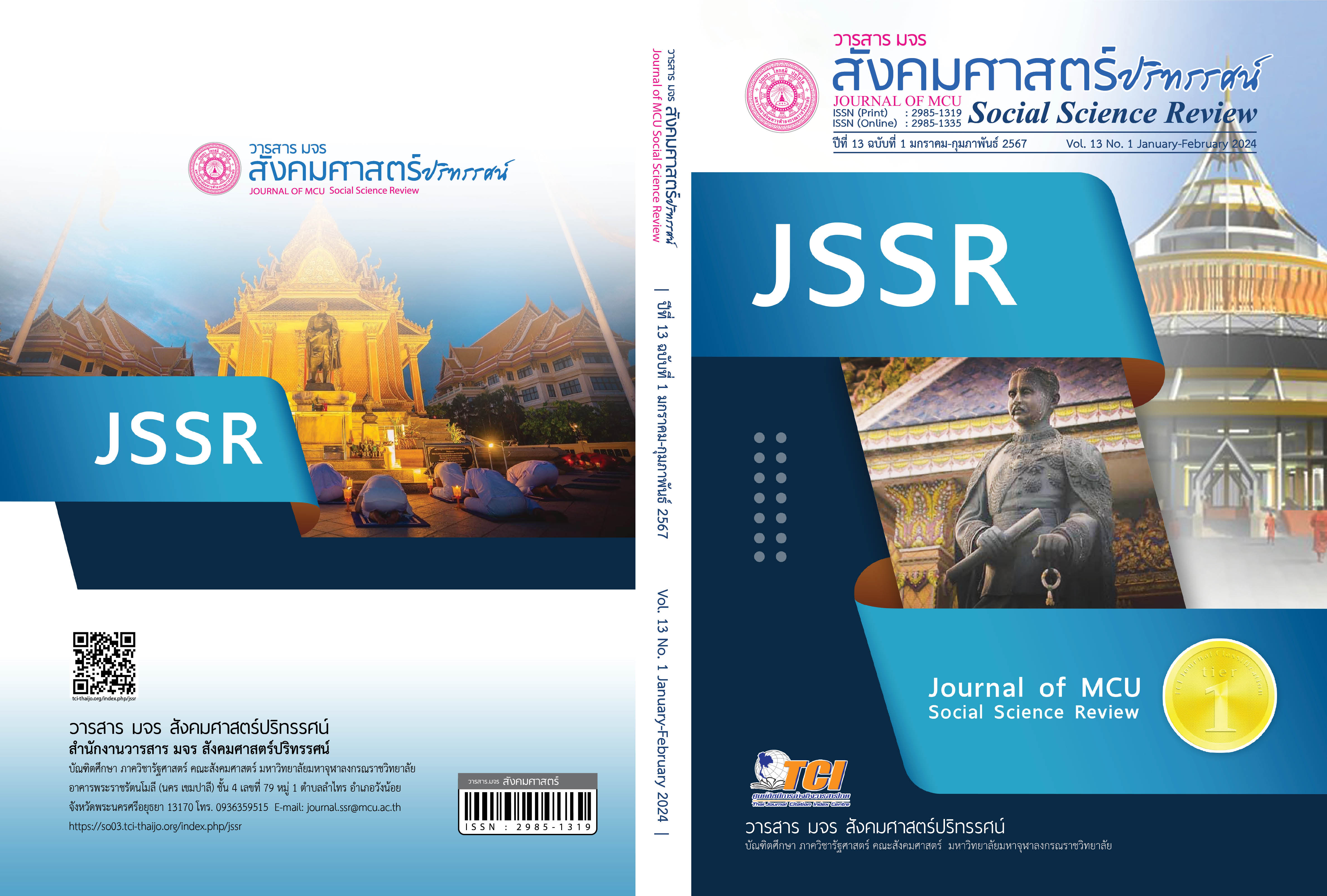การมุ่งเน้นการตลาด การเรียนรู้ ความเป็นผู้ประกอบการส่งผลต่อความสามารถทางนวัตกรรมและผลการดำเนินงานของสหกรณ์การเกษตรในประเทศไทย
คำสำคัญ:
การมุ่งเน้น, ความสามารถทางนวัตกรรม, สหกรณ์การเกษตรบทคัดย่อ
บทความวิจัยนี้มีวัตถุประสงค์ 1. ศึกษาการมุ่งเน้นตลาด การมุ่งเน้นการเรียนรู้การมุ่งเน้นความเป็นผู้ประกอบการ มีอิทธิพลต่อความสามารถทางนวัตกรรมและผลการดำเนินงาน 2. ศึกษาความสามารถทางนวัตกรรมมีอิทธิพลต่อผลการดำเนินงาน 3. ศึกษาการมุ่งเน้นตลาด การมุ่งเน้นการเรียนรู้ และการมุ่งเน้นความเป็นผู้ประกอบการส่งผลทางอ้อมต่อผลการดำเนินงานของสหกรณ์การเกษตรในประเทศไทย เป็นการวิจัยเชิงปริมาณ เก็บข้อมูลจากแบบสอบถาม กลุ่มตัวอย่างคือสหกรณ์การเกษตรประจำอำเภอ จำนวน 392 แห่ง สถิติที่ใช้ในการวิจัยคือสถิติเชิงพรรณนาและการวิเคราะห์โมเดลสมการโครงสร้าง (Structure Equation Model: SEM) โดยค่าความสอดคล้องกับข้อมูลเชิงประจักษ์ที่ได้คือ CMIN/df=1.934, CFI=0.984, GFI=0.941, RMR = 0.016 และ RMSEA = 0.049
ผลการวิจัยพบว่า 1. การมุ่งเน้นการเรียนรู้ การมุ่งเน้นความเป็นผู้ประกอบการมีอิทธิพลทางตรงต่อความสามารถทางนวัตกรรม และการมุ่งเน้นการเรียนรู้มีอิทธิพลทางตรงต่อผลการดำเนินงาน 2. ความสามารถทางนวัตกรรมมีอิทธิพลทางตรงต่อผลการดำเนินงาน
3. การมุ่งเน้นการเรียนรู้ และการมุ่งเน้นความเป็นผู้ประกอบการมีอิทธิพลทางอ้อมต่อผลการดำเนินงานโดยส่งผ่านความสามารถทางนวัตกรรม ดังนั้นการมุ่งเน้นการเรียนรู้เป็นตัวแปรสำคัญที่จะช่วยสร้างพฤติกรรมต่อการสร้างสรรค์นวัตกรรมใหม่ ๆ ให้กับองค์กร ขณะที่การมุ่งเน้นความเป็นผู้ประกอบการจะทำให้บุคลากรสามารถวิเคราะห์สภาพแวดล้อมทางธุรกิจเพื่อเพิ่มโอกาสในการมองหาความคิดใหม่ ๆ ที่ก่อให้เกิดความสามารถทางนวัตกรรมต่อองค์กร
เอกสารอ้างอิง
กัลยา วานิชย์บัญชา. (2556). การวิเคราะห์สมการโครงสร้าง (SEM) ด้วย AMOS. กรุงเทพฯ: ห้างหุ้นส่วนจำกัดสามลดา.
ปรารถนา หลีกภัย และคณะ. (2557). ความสามารถทางนวัตกรรมของธุรกิจโรงแรมในภาคใต้ของประเทศไทย. วารสาร วิทยาการจัดการ, 31(1), 69-95.
ปุณยวีย์ สุขรุ่งเรืองสันติ และสุดาพร สาวม่วง. (2554). นวัตกรรมทางการตลาดด้านการพัฒนาผลิตภัณฑ์ใหม่ของอุตสาหกรรมอาหารกระป๋องไทย. BU Academic Review, 10(1), 373-386.
วัชรพันธ์ ผาสุข. (2557). การมุ่งเน้นตลาดและการมุ่งเน้นการเรียนรู้ในการพัฒนาความสามารถทางนวัตกรรมและผลการดาเนินงานของธุรกิจอุตสาหกรรมขนาดกลาง. วารสารการจัดการภาครัฐและภาคเอกชน, 21(2), 102-126.
ศิริลักษณ์ นามวงศ์ และประเสริฐ จรรยาสุภาพ. (2560). บทบาทของสหกรณ์ไทยในยุคเศรษฐกิจใหม่. วารสารสังคมศาสตร์ มหาวิทยาลัยวลัยลักษณ์, 10(2), 144-183.
Asad, M., et al. (2018). Do Entrepreneurial orientation and size of enterprise influence the performance of micro and small enterprises? A study on mediating role of innovation. Management Science Letters, 8, 1015–1026.
Calantone, R. J., et al. (2002). Learning orientation, firm innovation, and firm performance. Industrial Marketing Management, 31(6), 515-524.
Distanont, A. & Khongmalai, O. (2020). The role of innovation in creating a competitive advantage. Kasetsart Journal of Social Sciences, 41(1), 15-21.
Fornell, C. & Larcker, D.F. (1981). Evaluating structural equation models with unobservable variables and measurement error. Journal of Marketing Research, 18(1), 39–50.
Genc, E., et al. (2019). The impact of SME internationalization on innovation: The mediating of market and entrepreneurial orientation. Industrial Marketing Management, 82, 253-264.
Hajar, I. (2015). The Effect of Business Strategy on Innovation and Firm Performance in the Small IndustrialSector. The International Journal of Engineering and Science, 4(2), 1-9.
Hu, L. & Bentler, P.M. (1998). Fit indices in covariance structure modeling: Sensitivity to underparameterized model misspecification. Psychological Methods, 3(4), 424–453.
Hult, G. T. M., et al. (2004). Innovativeness: Its antecedents and impact on business performance. Industrial Marketing Management, 33, 429-438.
Ismail, I., et al. (2019). The effect of market orientation, innovation, organizational learning and entrepreneurship on firm performance. Journal of Entrepreneurship Education, 22(3), 1-13.
Mahmoud, M. A., et al. (2016). Market orientation, learning orientation and business performance: The mediating role of innovation. International. Journal of Bank Marketing, 34(5), 623-648.
Martínez, J. E. V., et al. (2018). The Relationship Between Market Orientation, Entrepreneurial Orientation and Learning Orientation on Innovation and its Effect on Performance in Mexican SMEs. International Business Management, 12(2), 132-144.
Narver, J. C. & Slater, S.F. (1990). The Effect of a Market Orientation on Business Profitability. Journal of Marketing, 54(4), 20-35.
Oktavio, A., et al. (2019). Learning Orientation, Entrepreneurial Orientation and Their impacts on New Hotel Performance: Evidence from Surabaya. Journal of Applied Management, 17(1), 8-19.
Phorncharoen, I. (2020). Influence of market orientation, learning orientation, and innovativeness on operational performance of real estate business. International Journal of Engineering Business Management, 12, 1–11.
Rhee, J., et al. (2010). Drivers of innovativeness and performance for Innovative SMEs in South Korea: Mediation of learning orientation. Technovation, 30(1), 65-75.
Soares, M. D. C. & Perin, M. G. (2020). Entrepreneurial orientation and firm performance: an updated meta-analysis. RAUSP Management Journal, 55(2), 143-159.
Yuliansyah, Y., et al. (2021). Organizational learning, innovativeness, and performance of financial service firms in an emerging market: examining the mediation effects of customer-focused strategy. Business Process Management Journal, 27(4), 1126-1141.
ดาวน์โหลด
เผยแพร่แล้ว
รูปแบบการอ้างอิง
ฉบับ
ประเภทบทความ
สัญญาอนุญาต
ลิขสิทธิ์ (c) 2024 วารสาร มจร สังคมศาสตร์ปริทรรศน์

อนุญาตภายใต้เงื่อนไข Creative Commons Attribution-NonCommercial-NoDerivatives 4.0 International License.
เพื่อให้เป็นไปตามกฎหมายลิขสิทธิ์ ผู้นิพนธ์ทุกท่านต้องลงลายมือชื่อในแบบฟอร์มใบมอบลิขสิทธิ์บทความให้แก่วารสารฯ พร้อมกับบทความต้นฉบับที่ได้แก้ไขครั้งสุดท้าย นอกจากนี้ ผู้นิพนธ์ทุกท่านต้องยืนยันว่าบทความต้นฉบับที่ส่งมาตีพิมพ์นั้น ได้ส่งมาตีพิมพ์เฉพาะในวารสาร มจร สังคมศาสตร์ปริทรรศน์ เพียงแห่งเดียวเท่านั้น หากมีการใช้ภาพหรือตารางหรือเนื้อหาอื่นๆ ของผู้นิพนธ์อื่นที่ปรากฏในสิ่งตีพิมพ์อื่นมาแล้ว ผู้นิพนธ์ต้องขออนุญาตเจ้าของลิขสิทธิ์ก่อน พร้อมทั้งแสดงหนังสือที่ได้รับการยินยอมต่อบรรณาธิการ ก่อนที่บทความจะได้รับการตีพิมพ์ หากไม่เป็นไปตามข้อกำหนดเบื้องต้น ทางวารสารจะถอดบทความของท่านออกโดยไม่มีข้อยกเว้นใดๆ ทั้งสิ้น





